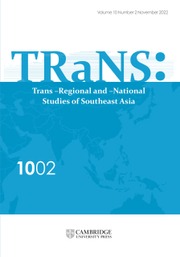No CrossRef data available.
Restricting Democratic Choice in Thailand's 2019 Election: “Retrograde” and “Sophisticated” Authoritarianism
Published online by Cambridge University Press: 23 March 2022
Abstract
Since the end of its absolute monarchy in 1932, Thailand has been variously described as a “hybrid regime,” “flawed democracy,” and “failed democracy.” Furthermore, its governance system has been identified as “electoral authoritarianism,” ‘hybrid authoritarianism,” “military domination,” and “Thai-style democracy.” Regardless of the analytic lens applied, the history of Thai politics has involved a continuing struggle for control of government between both authoritarian and democratic forces. Following the 2014 military coup d’état, the first election held in 2019 saw the 2014 military coup leader, General Prayuth Chan-o-cha, elected as prime minister. This article assesses the conduct and results of the 2019 election in terms of the general discourse on electoral authoritarianism and as an emerging framing of authoritarian regimes particularly applicable to Southeast Asia—the rise of “sophisticated authoritarianism.” This approach distills and integrates the discourse on electoral authoritarianism to produce a typology that is useful for considering the empirical characteristics of Southeast Asia. The 2019 election offers an opportunity to consider Thailand within this framing and to determine to what extent the military-dominated regime and its holistic manipulation of electoral institutions and processes can be assessed as “sophisticated authoritarianism.” This study demonstrates that Prayuth's election partially demonstrates “sophisticated authoritarianism”; nonetheless, his attempt to depoliticise Thailand and reduce it to a non-political state has met substantial resistance that will likely persist while he remains in power.
Keywords
- Type
- Original Article
- Information
- TRaNS: Trans-Regional and -National Studies of Southeast Asia , Volume 11 , Issue 1 , May 2023 , pp. 71 - 87
- Copyright
- Copyright © The Author(s), 2022. Published by Cambridge University Press on behalf of Institute of East Asian Studies, Sogang University





